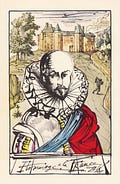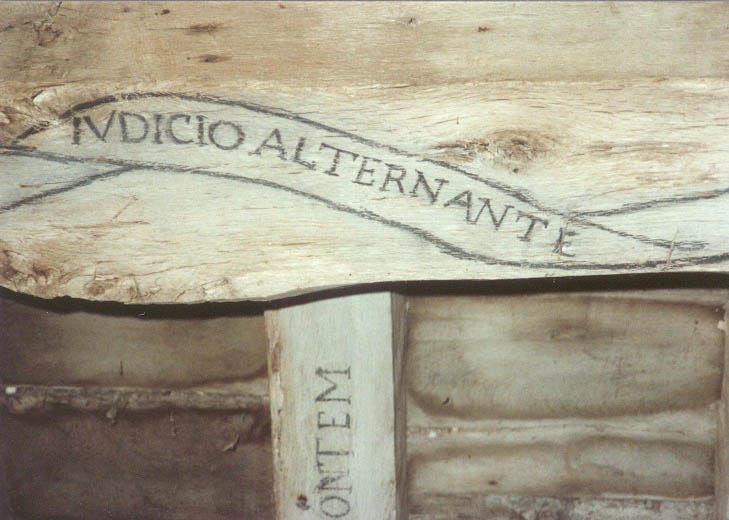Portrait of Michel de Montaigne by Salvador Dalí
“On the highest throne in the world, we still sit only on our own bottom.”
― Michel de Montaigne
Michel De Montaigne, skeptic, writer, & haver of thoughts, writes about almost anything that crosses his mind, from his painful goes with kidney stones, to cannibalism. What is so admirable about Montaigne is not what he understands but how he respects what he finds incomprehensible. He treats the mysterious with care & doesn’t attempt to explain it away. After all, it is said that he coined the phrase, “but what do I know?”.
Montaigne seems like the kind of guy to ramble on about something like cannibalism only to laugh it off at the end. He’s the guy who loves to sit back and chew the fat with anyone light-hearted enough to hang.
He retired from his day job at the ripe old age of 38, having worked in courts and held some local political positions, all which he dreaded. The way I see it, he stepped away from public life in order to to do more nothing, & other than his desire to stop doing what he didn’t enjoy, it doesn’t sound like he had much of a plan. Following this attitude of avoiding-what-you-don’t-like is about as alpha as it gets.
The fact you don’t want to should be enough reason to do anything, and you shouldn’t try to convince yourself (or guilt yourself) to continue on a path you don’t like, especially when it comes to something as serious as a career. It’s not healthy, nor sustainable. Unejpyable tasks will only compound, and doing enough of them over a long enough time will break you. Montaigne knew this. He could have been an aristocratic celebrity like his father, but instead, opted for a life of pontification and isolation, which suited him more. And props to him for that, it takes serious brass to do what you like, especially when the cost is giving up the more comfortable path for the more uncertain life of a craftsman.
After his retirement, Montaigne would spend most of his time in his library surrounded by books where he was free to spend his time as he wished.
On the ceiling above hung dozens of joists and beams with detailed inscriptions of short phrases and messages. These served as reminders to Montaigne, reminders of the attitude he would strive to embody as he was doing his mass investigation into the human experience. Most of the inscriptions came from antiquity, with sources like the Bible, Sophocles, and Sextus Empiricus, some of them included:
IVDICIO ALTERNANTE – Remain poised in the balance.
ΑΡΡΕΠΩΣ – [I am] without inclination. (Sextus Empiricus)
ΑΥΤΑΡΚΕΙΑ ΠΡΟΣ ΠΑΣΙΝ ΗΔΟΝΗ ΔΙΚΑΙΑ - Autonomy is the only just pleasure.
NVLLIVS VEL MAGNÆ VEL PARVÆ EARVM RERVM QVAS DEVS TAM MVLTAS FECIT NOTITIA IN NOBIS EST. - The notion of everything, large and small, of all the innumerable creatures of God, is to be found within us. (Ecclesiastes 3)
ΑΓΑΘΟΝ ΑΓΑΣΤΟΝ - The good is admirable. (Plato, via Sextus Empiricus)
ΟΥ ΚΑΤΑΛΑΜΒΑΝΩ – I do not understand. (Sextus Empiricus)
From what Montaigne had engraved on his ceiling, we can tell what kind of man he was and what his intentions were. His thoughts, like himself, were plain and pure, honest, always embracing the inconclusiveness of life’s wonders, never afraid to place himself at the foot of the human experience and stand in awe of it’s mysteriousness, and while there, possibly let out a hopeless chortle at the size of it all.
Maybe some opinion of his was wrong or worth arguing over, but he comes off as someone who wouldn’t want to argue with you over anything, really. He would simply ask you a new and totally unrelated question with the sole purpose of keeping the conversation going.
The reason Montaigne was able to pontificate on everything with a light attitude was because he didn’t take anything too seriously, especially his own opinions. And when he did have bold opinions, he had a sense of humility about them. Montaigne sees to many topics, but if there was anything Montaigne saw clearly, it was the bigger picture. At the existential level, he did not fear uncertainty, or epistemic humility, he gladly embraced them.
Whether you’re a product manager, data analyst, or a banker, a healthy embrace of uncertainty & humility is never something you’re asked to embody. All these nerds want is answers! This avoidance of the uncertain seems oddly suspicious, if not totally unsustainable for the human psyche. We would be better off embracing it and moving forward. The chillest folks in history were fine with the unexplainable, & not only were they fine with it, they could observe it and from it, extract some of nature’s most powerful lessons.
Intellectual certainty, being overly to our opinions, plagues our ideologies and our actions. People get paid to have opinions, not to be opinionless. This leads to us pulling opinions out of thin air, and when we don’t have an opinion on something we will formulate one on the spot. Our opinions have become our identity, & without opinions we are worthless.
We have grown incapable of tolerating the figurative, the mystical, the care free & the pointless. If we go long enough without a definitive answer to our questions we make one up - even if it’s wrong - all for a sense of closure. We become irate if our stories don’t have conclusive endings that satisfy our self imposed need for stories to be neatly tied off and make perfect sense.
We have answers for everything, how boring are answers? How dismissive? The obsession for answers makes us an impatient and uncreative people. Impatient & uncreative in all things, our work, our art and our relationships.
Arrogance may come from a number of places, but it certainly comes from a place of certainty. Certainty is lazy, certainty is uncreative. It lends to dismissiveness, to writing off the other side as evil, morally abhorrent and even unworthy. To be clear, there are things that deserve a strong and sturdy position of conviction, and it’s not even the certainty that is worrisome, it’s the arrogance that certainty is often tied too. Be certain, yet humble, that’s a powerful position.
Most importantly, epistemic arrogance is not compatible with mystery & wonder. Sometimes the most dangerous thing to do is be certain in our belief of how things are, or our belief that things are working when they actually might not be. Anything that enforces epistemic arrogance in an uncertain world should be avoided. In a world full of mystery and inconclusiveness, this is dangerous.
We could all question ourselves a little more.
There are things that are compatible with uncertainty, things we can do to embrace it. For starters, setting off on one’s own in any way is a great way. Creating something from scratch, a line of code, a book, an album. Really, doing anything that requires not knowing what comes next, but inching one’s way into the fog. Following your nose, and avoiding what you don’t enjoy, like Montaigne.
When it comes to creating something, starting something, or setting off to do something new, not much else matters other than courage. Talent? Meh. “Non-talented” noobs make it all the time. Accomplishments? Too flukey. Prone to one-offs.
In the face of uncertainty, all that is real is courage.






‘ All these nerds want is answers!’
Fantastic piece here Mr Brown, glad to see you writing as you are a much needed corrective and one of the most interesting voices around (and I say that not just because we tend to have a similar outlook on life)
The thing I find particularly amusing is how when you start to talk about idleness, escaping the rat race and encouraging people to simply give themselves permission to just ‘be’ what ends up happening is that they end up improving for the better and getting things done, ironically enough. True idleness needs true effectiveness.
The irony then is that all of this hustle culture makes people lazy and procrastinate whereas being lazy and at leisure makes people pursue activities out of mere whim and curiosity and in the process actually make strides in their life. But try boiling that sentiment down to a 5 bulletpoint twitter thread.
Your friend from beyond the social media veil,
Tom.